Book contents
- Frontmatter
- Contents
- List of illustrations
- Acknowledgements
- Introduction
- PART I TECHNIQUES OF GHOST-SEEING
- PART II THE BUSINESS OF ROMANCE
- PART III THE STRANGE LUXURY OF ARTIFICIAL TERROR
- 6 Women, luxury and the sublime
- 7 The supernatural explained
- 8 Like a heroine
- PART IV MAGICO-POLITICAL TALES
- Afterword
- Notes
- Bibliography
- Index
- CAMBRIDGE STUDIES IN ROMANTICISM
6 - Women, luxury and the sublime
Published online by Cambridge University Press: 03 December 2009
- Frontmatter
- Contents
- List of illustrations
- Acknowledgements
- Introduction
- PART I TECHNIQUES OF GHOST-SEEING
- PART II THE BUSINESS OF ROMANCE
- PART III THE STRANGE LUXURY OF ARTIFICIAL TERROR
- 6 Women, luxury and the sublime
- 7 The supernatural explained
- 8 Like a heroine
- PART IV MAGICO-POLITICAL TALES
- Afterword
- Notes
- Bibliography
- Index
- CAMBRIDGE STUDIES IN ROMANTICISM
Summary
That course of Reading must be unprofitable, which is confined to Novels; and this, I am apprehensive, is too much the case with your Sex. The Press daily teems with these publications, which are the trash to circulating Libraries. There are but few Novels, which have a tendency to give a right turn to the affections; or, at least, are calculated to improve the mind. A perusal of them, in rapid succession, is, in fact, a misemployment of time; as, in most Novels, there is a similarity in the incidents and characters; and these perhaps are unnatural, or seldom to be found in real life: so that young Women, who apply themselves to this sort of Reading, are liable to many errors, both in conduct and conversation, from the romantic notions they will thence imbibe. Novels are the last Books which they should read; instead of being almost the first.
This passage offers a relatively sober rehearsal of a theme which resounded through the late eighteenth and early nineteenth centuries. It sketches the typical novel-reader as a member of ‘your Sex’, a young woman, the blankest tabula rasa, her mind a passive, soft, unresisting medium for external impressions, her affections absolutely malleable, able to be turned one way or another, for good or ill. The average novel is said to deal in ‘unnatural’ images, characters and incidents ‘seldom to be found in real life’. By fitting her ideas to fictional standards the reader-as-receptor, by a mechanistic determination, is unfitted for her role in the world of the everyday.
- Type
- Chapter
- Information
- The Rise of Supernatural Fiction, 1762–1800 , pp. 95 - 105Publisher: Cambridge University PressPrint publication year: 1995

